Travels with my mom
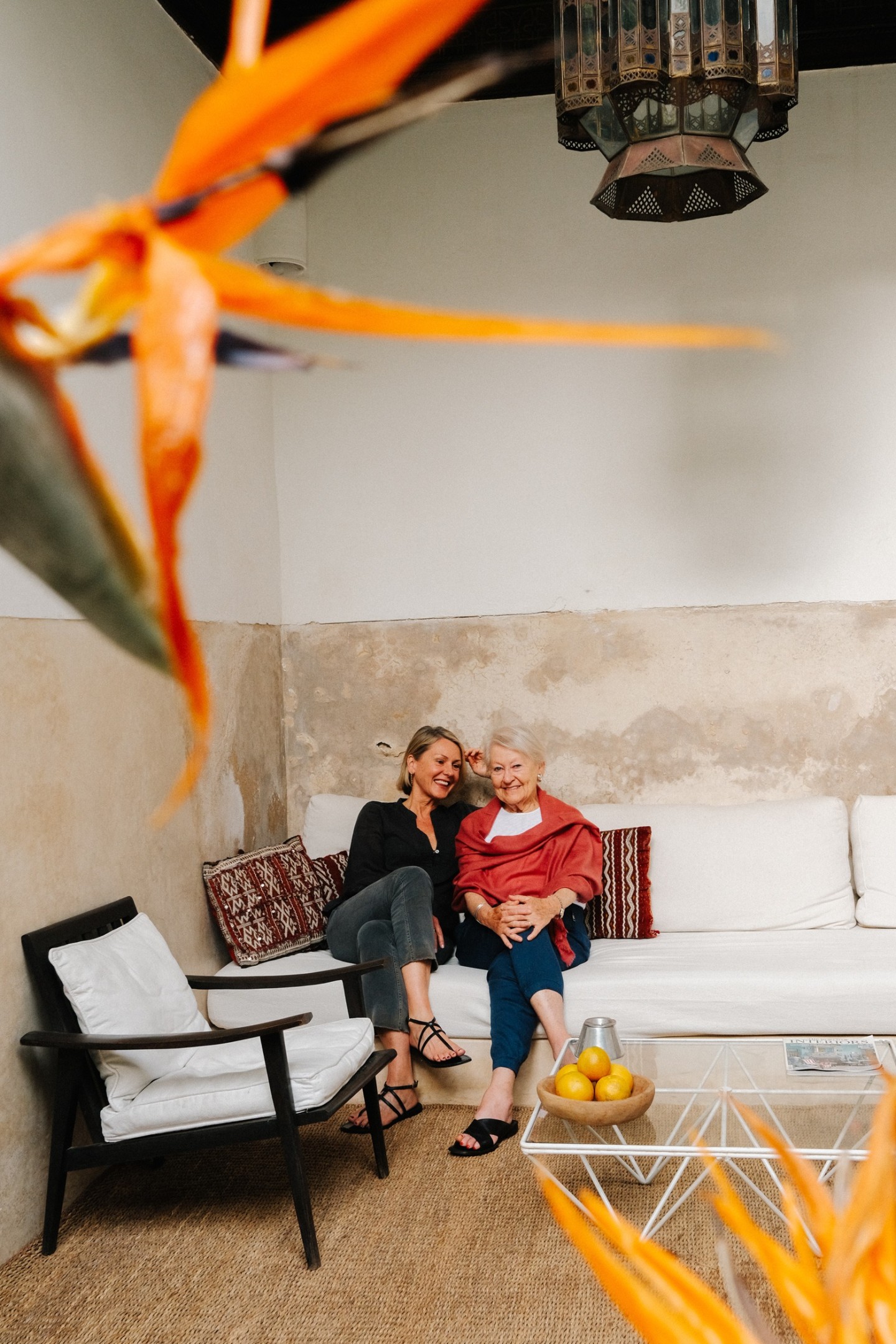
Roula Khalaf, Editor of the FT, selects her favourite stories in this weekly newsletter.
My mother first heard the sound of the prayer call in Morocco 13 years ago. I was in Marrakech, sitting on the balcony of my hotel room near the Koutoubia, the city’s famous medieval mosque; she was 6,000 miles away, in California. In the ink-washed dusk, the adhan rang out: a sonorous monotone, joined within seconds by a dozen more voices, rising in a chorus that commanded the sky. I took a video, scanning the tops of palm trees, and sent it to her with a message: “Sound up!” A few minutes later, she opened her phone and listened to it. Then she listened again, and again, and again.
Morocco is one of the countries I know and love best. There is something about its cultures, both Arab and Berber, that is deeply compelling: at once inscrutable and full of heart. I’ve slept in forgotten villages and tents in stone deserts, and watched the rising sun set the snowy peaks of the High Atlas alight. From El Jadida to Guelmim, I’ve attempted (and failed) more times than I can count to bridge the camaraderie gap with my middling French and my five or so words of Arabic.
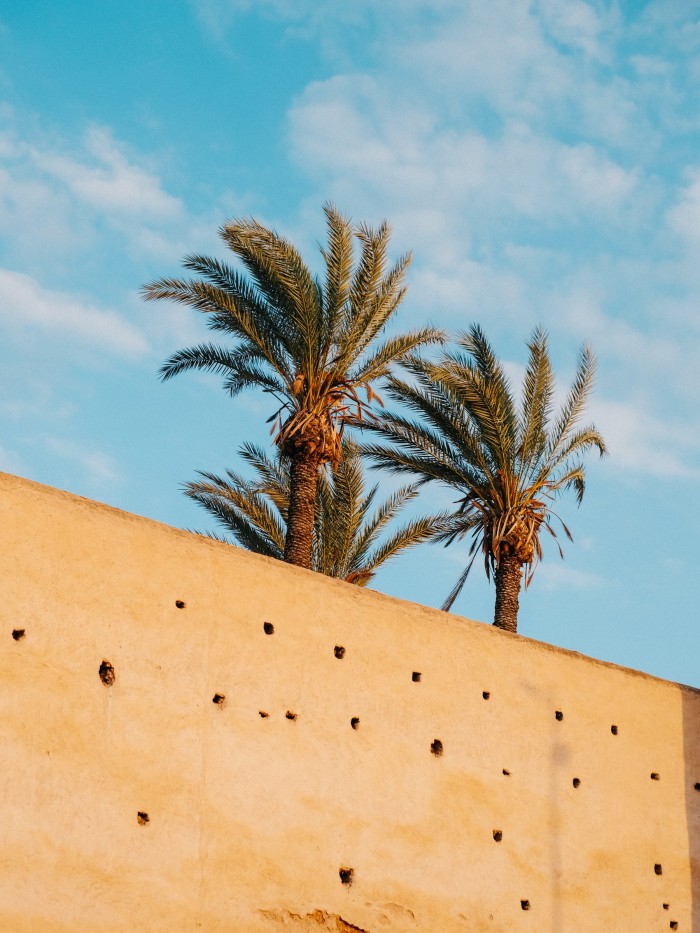
My mother’s imagination was sparked by that first sound, those landscapes, that inscrutability. We made a vow: see the country together, just the two of us. In the ensuing years, images from more trips – around a dozen of them, by my count – filled her phone. Various tentative dates and plans were tabled. And, inevitably, various life exigencies, usually mine, intervened. The vow began to shimmer, becoming worryingly transparent.
Then, this year, it suddenly coalesced again around a milestone: her 80th birthday, and a set of dates in April that worked for both of us. I had the reality of time constraints – we had just seven days – to contend with, as well as the divergent needs and interests that attend multi-generational adventures. My mom has no passion for shopping, for instance, but can observe people or walk in nature – still, at 80 – for hours. I wanted to balance history and beauty, people and landscape, with comfort, and perhaps the smallest bit of comfort-zone pushing.
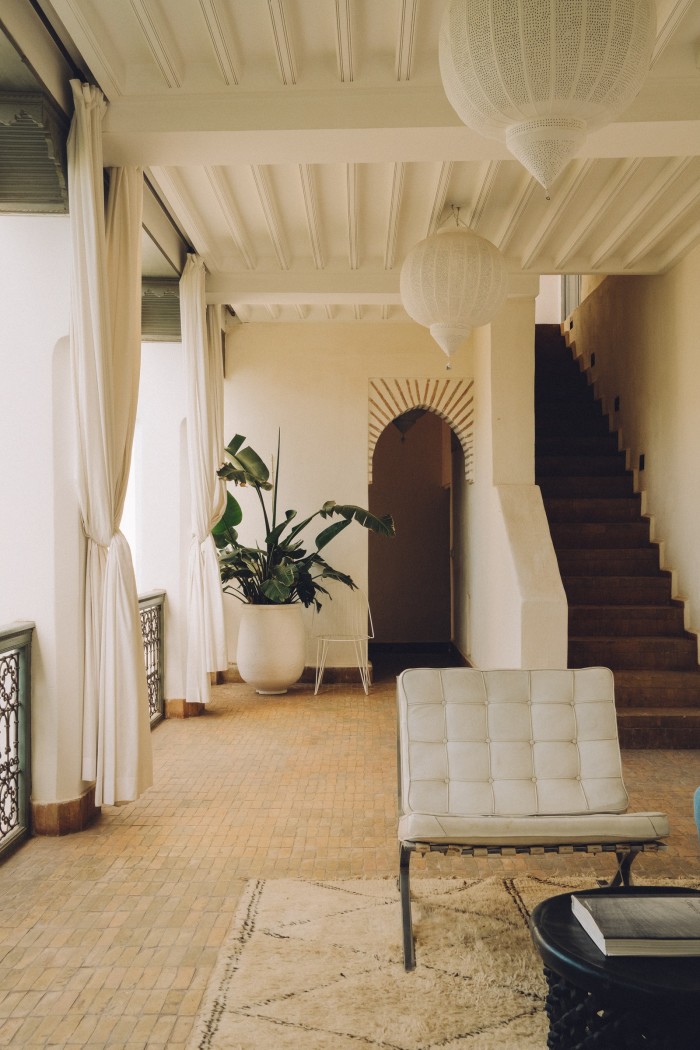
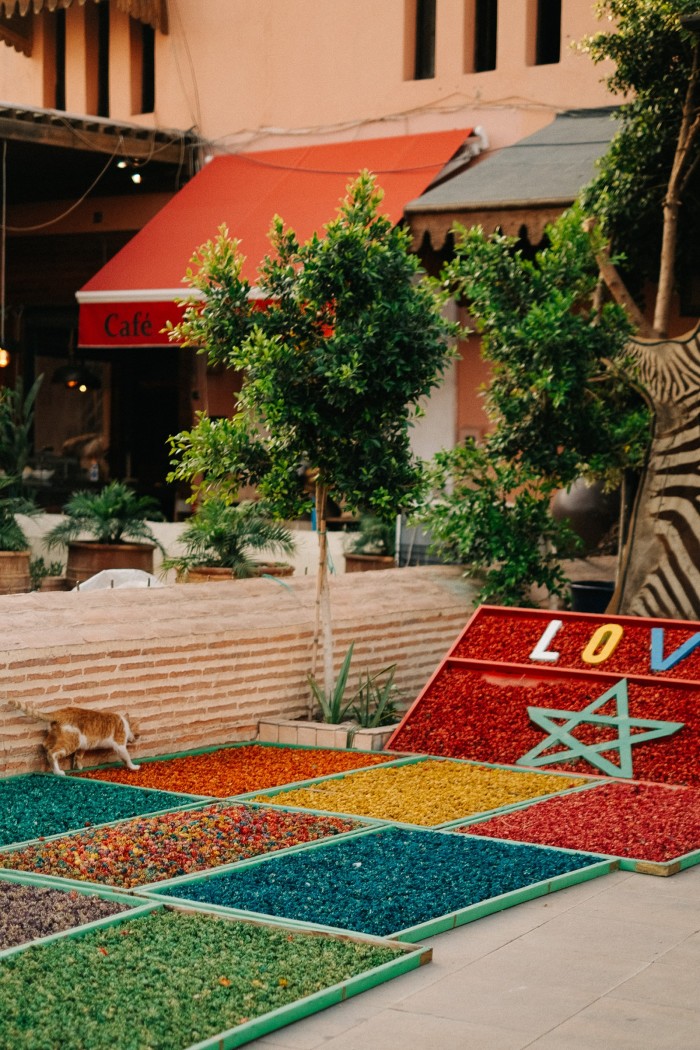
We met in Paris first, so she could acclimatise to the time change. As we ate asparagus at Le Bonaparte and walked past grey Haussmann façades through intermittent drizzle, I thought about the contrast with what was coming: heat, colour, smells, language, an iteration of Africa she’d never seen.
After a day made long by delays, Marrakech finally materialised through a prismatic veil of dust. The Koutoubia was just visible in the distance as we touched down. We dropped our bags at Riad Mena, the beautiful seven-bedroom hotel that was to be our base, and immediately headed out for a food tour of the medina. Weaving through the Kasbah and the Mellah, the old Jewish market, we sampled and savoured: kefteh sliced off skewers in strips, olives brined with coriander or rosemary or cumin, picked from huge wood spoons dipped into vats. There were honey-soaked briouates and amlou, the Berber butter made from crushed almonds, honey and argan oil. We walked and walked. My mother leaned in earnestly to taste this and that, to decipher the French and accented English over Arabic pop blaring from various speakers. Rug sellers unfurled their azilals and kilims like exotic heraldry, juice vendors beckoned. I shadowed her as she trod quickly but carefully; small steps, navigating people and puddles and darting scooters, fielding waves of colour and sound. It was three days before Eid, the end of Ramadan, and I’d thought Marrakech might feel different, quieter; but if anything it was at a higher pitch, swelled by ranks of tourists. For almost three hours we traversed the old souks, encircled by their thousand-year-old walls.
At the end of the evening, as we sat down to a ftour, the Ramadan fast-breaking to which our guides had invited us, I looked over at her. She smiled back, smiled out over Jemaa el-Fna Square. Then the prayer call began to sound. She closed her eyes, put her hands on the table in front of her, listening. I realised she had been waiting for it. I also realised something she’d not have said herself: she was exhausted.
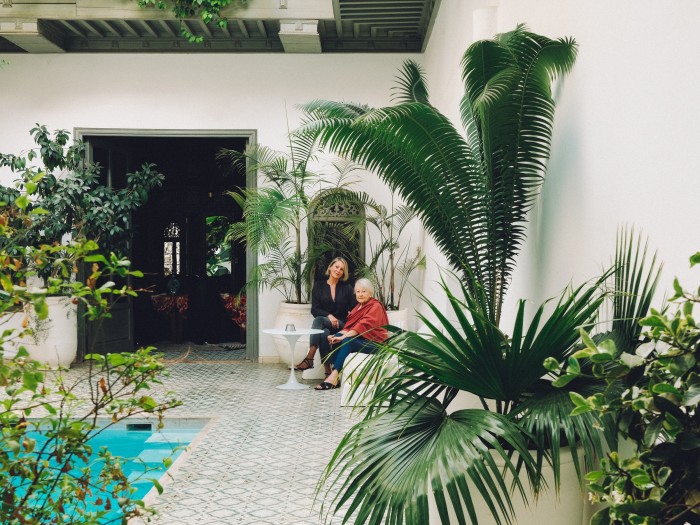
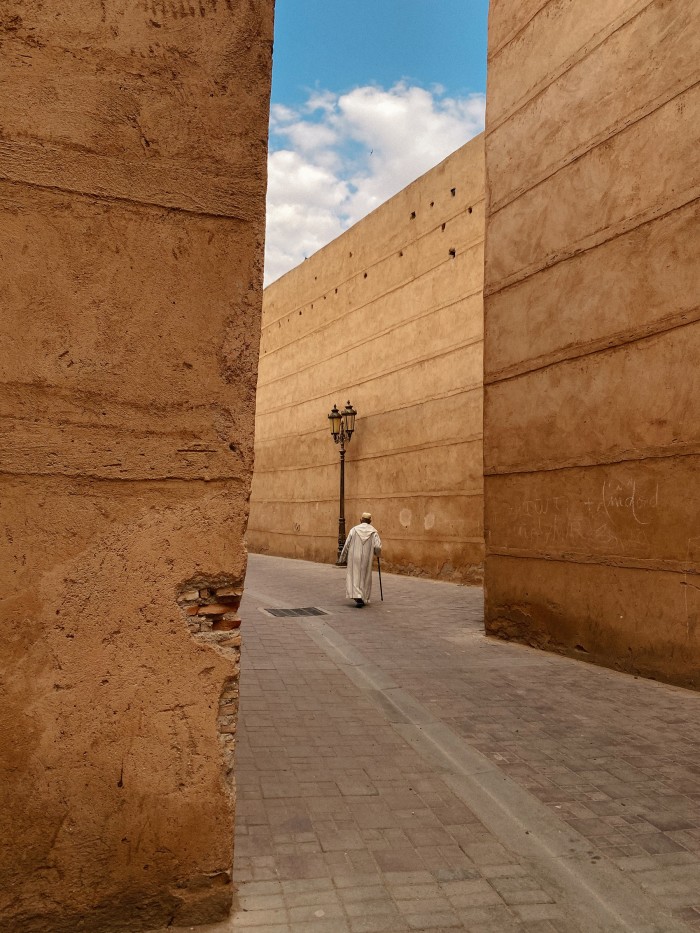
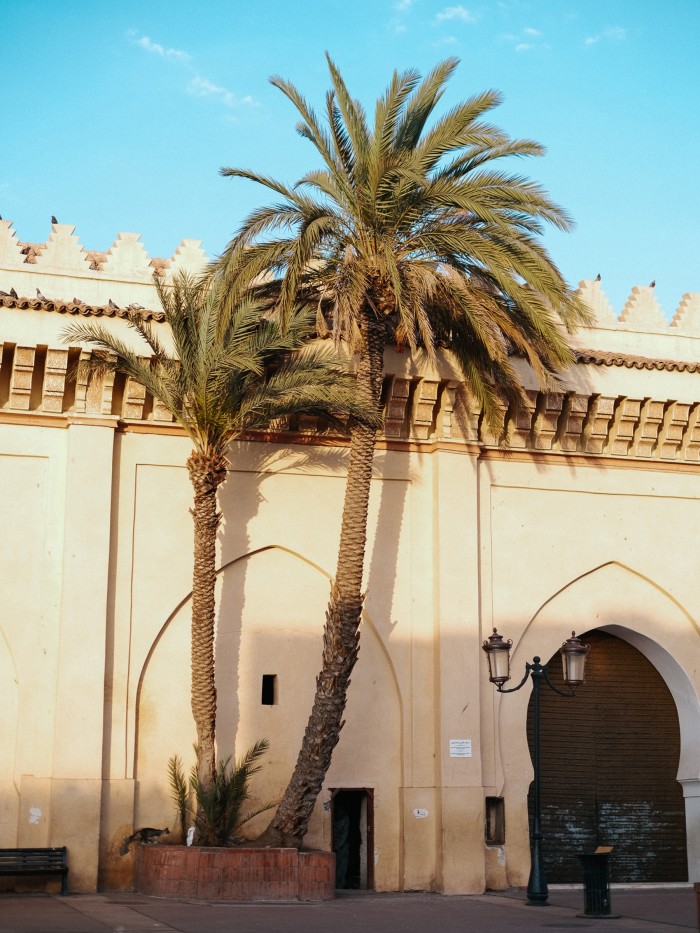
Marrakech can overwhelm at any age. We slowed the pace. We spent the next morning in the Majorelle gardens, considering the blues and yellows of Jacques Majorelle’s studio against profusions of cacti and bougainvillea – a chromatic nirvana, redolent of pungent desert plants. We wandered in the 16th-century Ben Youssef madrasa with a guide, ran our hands over zellige-tiled walls and Koranic verses rendered in carved plaster. We ventured back into the souks around Mouassine, whose wider alleys are more tranquil. I took photos so she didn’t have to: red doors against pink walls, ornate incisions in silver lanterns, the patterns and shapes that caught and held her attention.
In the afternoons we stayed at the riad, on a terrace overlooking the courtyard, talking, reading, watching the one tall palm nod its shaggy head in the breeze. Delicate patterns of light spread across the bed in our room, filtered through the latticed menzeh window. The muezzin was fainter here; we’d pause our chat to listen. The quiet was like a balm.
We drove out of the city early one morning, taking the Tizi N’Tichka pass through the High Atlas. Within an hour the landscape was utterly changed. Stands of poplar and birch – mountain trees, their leaves glittering like coins sifting through fingers – filled the gullies between volcanic peaks. When we descended into the desert plain hours later, she was transfixed by shifts in scenery: the orange earth fading, as soil mixed with sand; steep slopes ceding to low mesas, some covered in the faintest down of green. Beyond, the emptiness of stone desert.
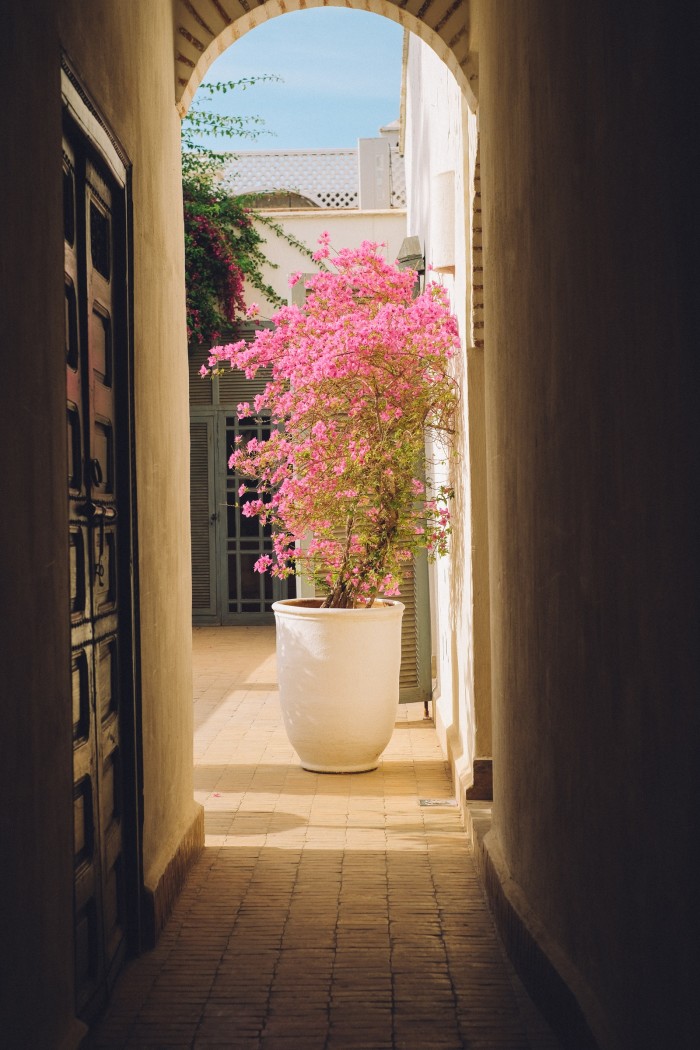
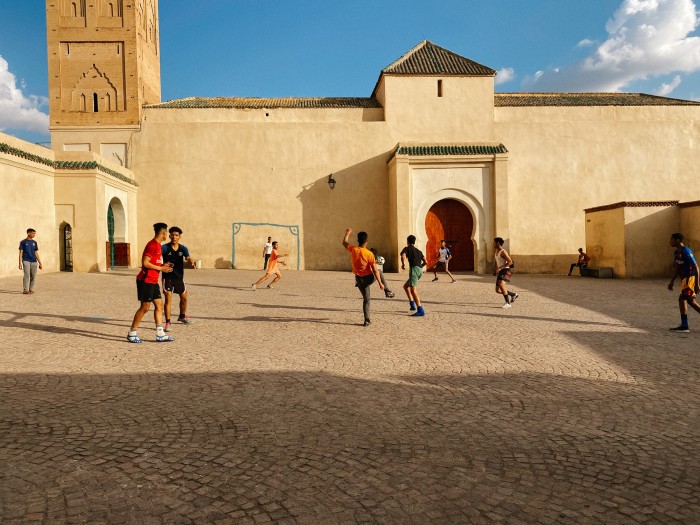
My mother had heard all about Dar Ahlam, the 18th-century ksar deep in the Skoura oasis, converted into a hotel 21 years ago by its French owner, Thierry Teyssier. A stay here is a sort of carefully scripted fever dream of Morocco. Every experience is an occasion, from a rooftop supper lit by hundreds of candles to a hike in the Valley of the Roses, where you turn a corner and come upon a bivouac, cushions, a table – a surprise picnic conjured, like a mirage, ahead of your arrival.
The oasis, in a more prosaic way, is as magical as the hotel. Some of the ksars, once homes to prosperous date farmers, are in picturesque ruins; a few, like Dar Ahlam, have been painstakingly restored. Quiet dirt roads weave between fields of barley and olive and pomegranate groves. Donkeys, laden with their bales of cut grass, graze quietly in the sun; palms sprout erratically everywhere. An irrigation system of channels and subterranean tunnels called khettarat runs along the roadsides; water whispered as we made our way on foot to the house of Dar Ahlam’s retired gardener, Momo, who is renowned locally for the quality of his fruits and vegetables. Seated in the shade of a trellis in his garden, we ate simple grilled aubergine terrines and tomato salad, while his eight-year-old daughter, Heba, practised her English counting skills on us.
On a past trip, I’d hiked the length of a gorge called Sidi Flah, about a half hour’s drive away. This time, we drove out to watch the sunset from an outlook above it, a prime spot with a view out over miles of desert. Clouds had been amassing all that afternoon, and the wind picked up as we left. We parked and walked the final several yards up to the ridge where a low table, set for tea, awaited us. Two hotel guides laughed as they scrambled to secure the tablecloth with stones and right overturned lanterns. I took my mother’s arm as a strong gust pushed us both sideways, asked her if she was OK. She offered a bright “Yes, honey!” with a smile that seemed to say, “Maybe?” We sat, our clothes billowing wildly. Fouad, our guide, whose face folded into a hundred creases when he smiled, prepared our tea. Three times rinsing the leaves; add muddled fresh mint; three more times, rinsing and pouring. Miles away, the cloud lifted from the tops of the mountains and the red crescent of the sun cast their summits in relief. The wind began to die down, the enveloping silence of the south reassuming its place.
Days before, lying in the lacework of light on our bed at Riad Mena, I’d asked my mother what came to mind when she thought of the desert. “In a desert, you’re unencumbered by excess,” she said finally, after considering for several seconds. “There’s the potential for aloneness; a sense of no confinement. A desert directs you back to yourself.”
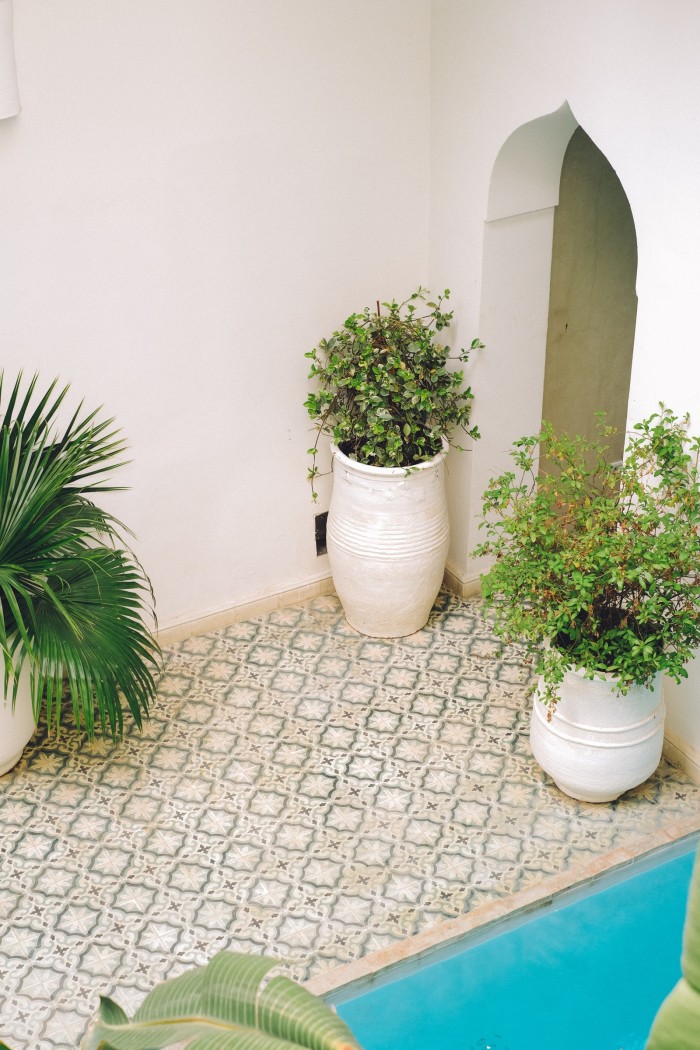
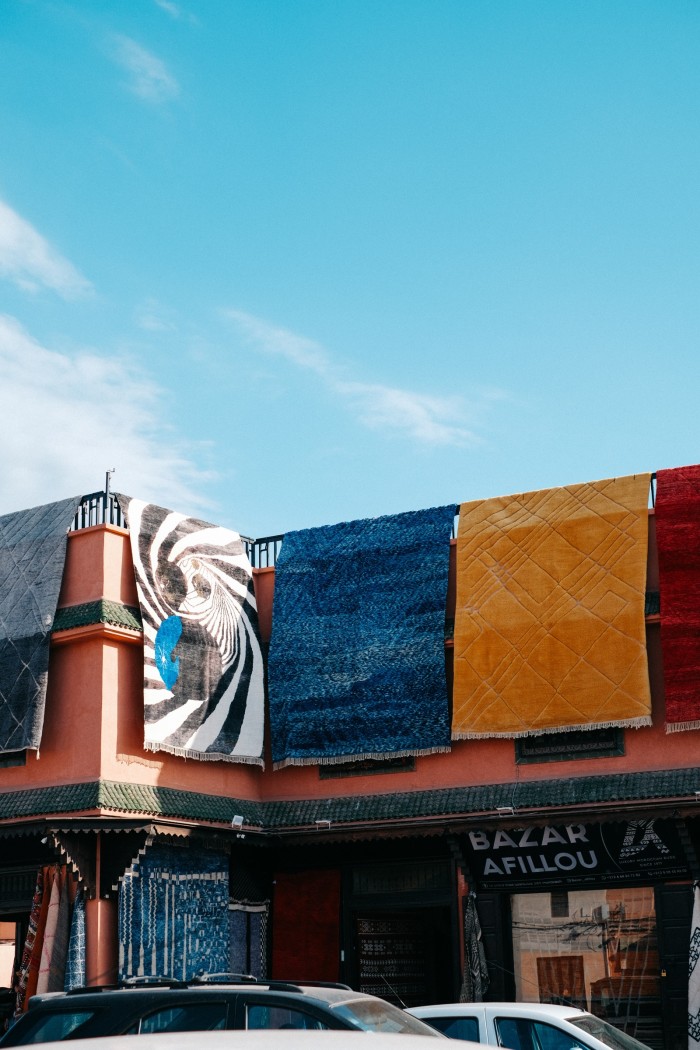
As I watched her sitting at the edge of the gorge, poised cautiously on the blankets, her fine white hair whipping around her face, I thought about deserts, and selves. When she was pregnant with me, she’d told me at some point on our journey, she used to go to Huntington beach and dig a hole in the sand, into which she could fit her burgeoning belly. She wanted to immerse me in that place, she said, to create for me a sense of being there, even before I was born.
I can’t say if this is why today oceans and beaches are the alpha and omega of my sacred geography. I do know that my mother’s thoughtfulness and selflessness have been gifts that have shaped the trajectory my life; gifts I leveraged to pursue paths that took me far away from her, for years at a time – something that, as she only recently admitted to me (such is her selflessness), has caused her real heartache. We are very close, and very different. She is gentle, and patient; she has never felt compelled to exert dominion over the events of her life in order to feel safer in it. Above all she is a mother, heart and soul, through and through. I am restless; I have never understood how to reconcile being pliant with being strong, so am often brittle instead. I never had children; there is no daughter, no point of reference or orientation for me to understand what our relationship has, for her, contained.
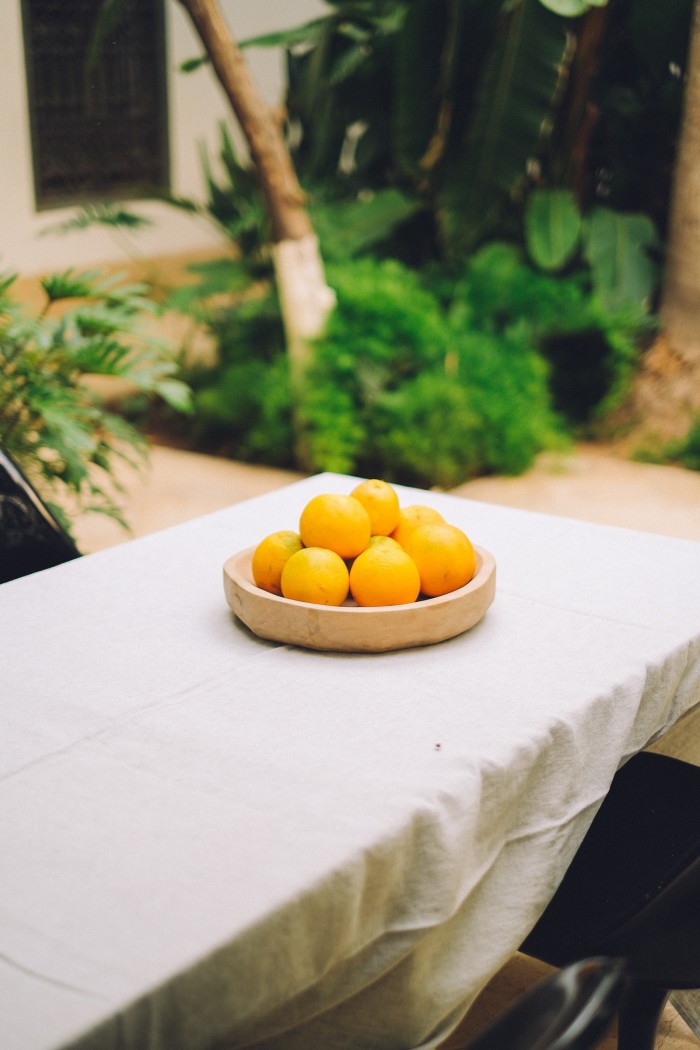
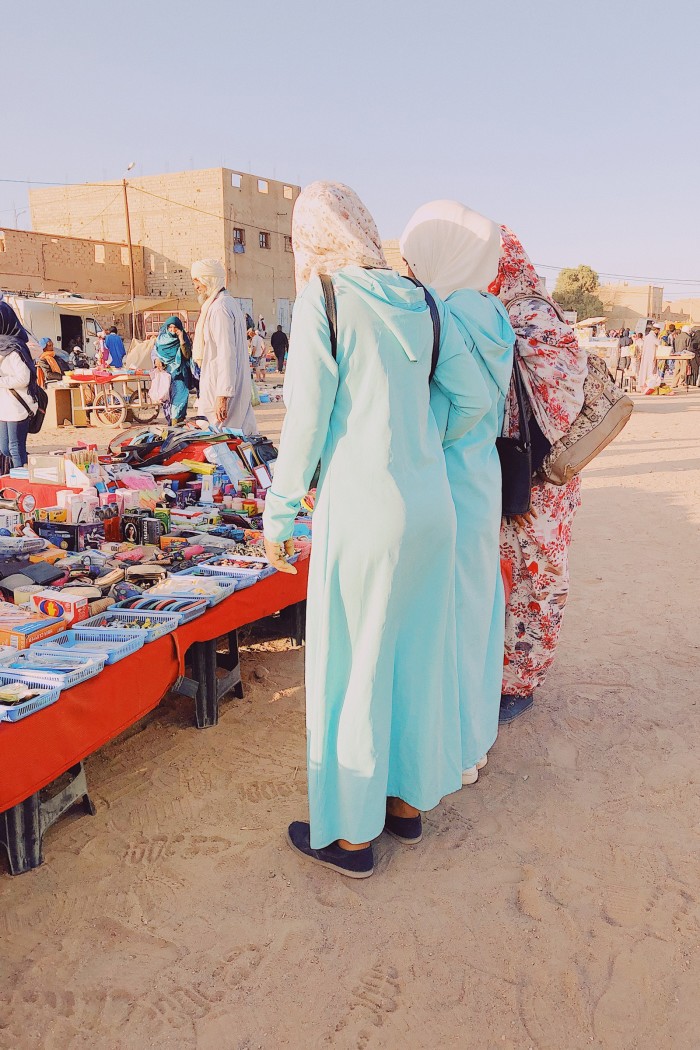
She is 80 now. We live thousands of miles away from each other. Our time together is not over; but it is finite. In the vast rooflessness of the desert, this truth – she will be gone one day – is almost too much to be borne. “Are you crying again?” she has asked me gently, smiling, more than once already on this trip. And I have reached for her elbow or her hand, or kissed her soft, dry cheek; getting, and giving, what I can, while I can.
We drive back across the Atlas, stopping for a final night before she flies to San Francisco. Our hotel, called Olinto, is in a broad valley between high peaks. The gardens are beautiful; hundreds of olive trees shade lavender beds, terraces and courtyards, and ring the large pool, shaped like a pond. The nine suites are individual pavilions, with roof terraces and cinematic views. The service is slow and confused, but the place is deeply comfortable, coddling, the staff sweet to a person. We wash away the desert dust and dress a bit for dinner.
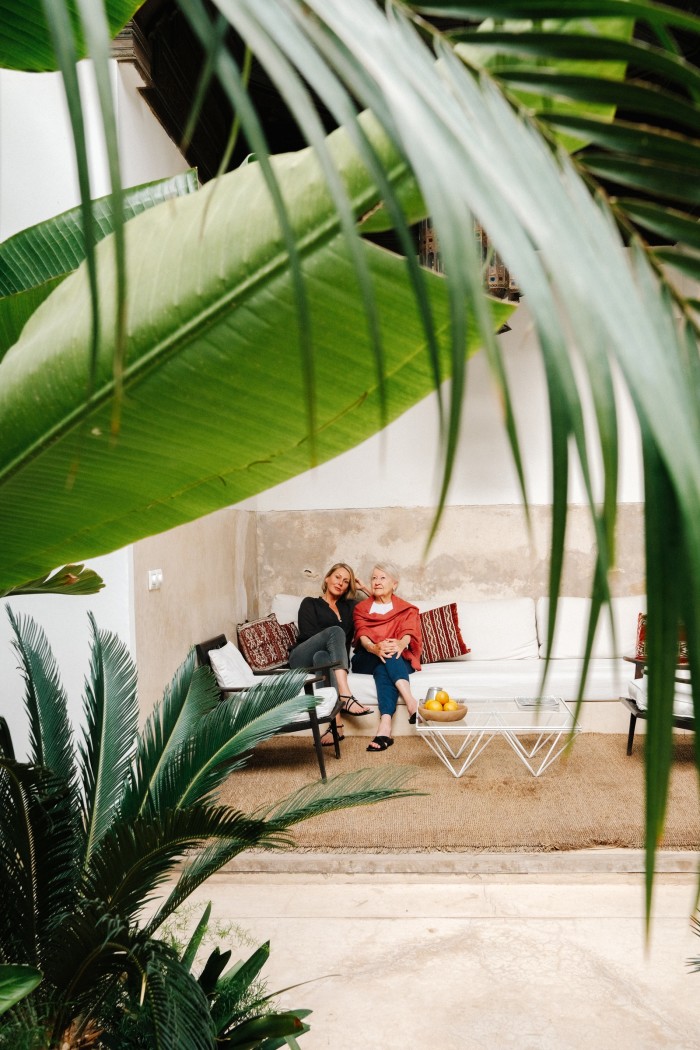
“Thank you for this wonderful gift,” she had said that afternoon, her own eyes bright. By which she means not just the trip, she continues, but the chance to step into my life – for her, an experience as foreign, as meaningful, as Morocco itself. I hold her hand, and think about how gifts of love are almost never commutable, and don’t have to be. At some point, we listen, together, to one last prayer call – pennants of sound released into the air, spiralling up, fading into the blue.
Maria Shollenbarger travelled with Cazenove+Loyd, which tailors trips to Morocco from £6,000pp for seven nights’ B&B including private experiences (excluding international flights). cazloyd.com, riadmenaandbeyond.com
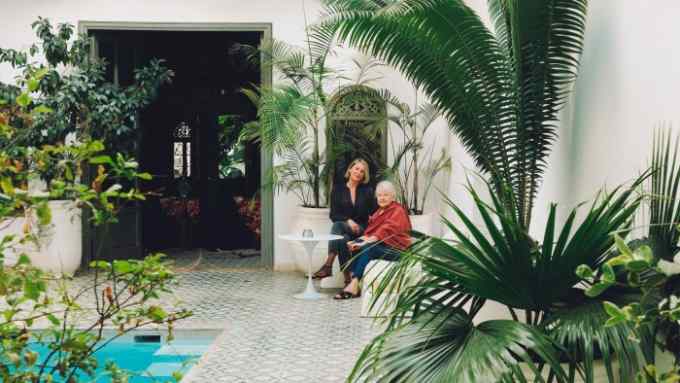
Comments